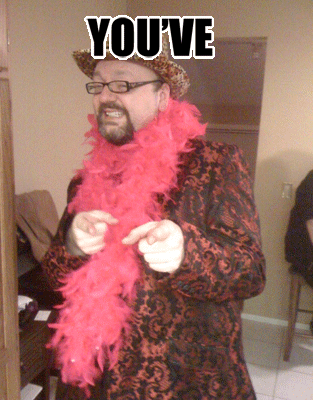Tags: BioWare; David Gaider
In response to the question "Are you guys aware of how many people avoid the Bioware Social Network like the plague?", Bioware's David Gaider has published a blog post that could as well have been entitled "Lalala, don't hear you!", in which he laments the "toxic" atmosphere and overall tone at the company's official forums, stating that he prefers to "largely avoid them these days" and not listen to the kind of feedback they provide. Shocking, isn't it?
Sounds like a cop-out to me. The sort of cop-out that he could also use to justify leaving the Codex forums a few years back. "It's not us and the kind of games we make, it's the fans!!" Of course, David. Keep fighting the good fight.
Thanks Yaar Podshipnik!
In response to the question "Are you guys aware of how many people avoid the Bioware Social Network like the plague?", Bioware's David Gaider has published a blog post that could as well have been entitled "Lalala, don't hear you!", in which he laments the "toxic" atmosphere and overall tone at the company's official forums, stating that he prefers to "largely avoid them these days" and not listen to the kind of feedback they provide. Shocking, isn't it?
They are certainly a group of passionate folks, and while I wouldn’t say they were all “utterly gross” as you put it I do agree that the overall tone of the forums has become increasingly toxic. I tend to largely avoid them these days, myself. Why? Because spending too much time there starts to make me feel negative— not just about the games we make, but about myself and life in general. That’s not a good feeling to have. I’m sure there are folks there who would bristle at that comment, suggesting that all negative feedback is justifiable and that ignoring it is the equivalent of us sticking our heads in the sand. How will we ever improve unless we listen to their scolding and take our lumps like good little developers? That is, of course, ignoring the idea that we haven’t already digested a mountain of feedback— both positive and negative— and there’s really only so much of it you can take. Eventually you make decisions (informed by that feedback, though only in part— it can only ever be in part) and move on.
[...] I imagine that can happen to any online community. Eventually the polite, reasonable folks stop feeling like it’s a group of people they want to hang around. So they leave, and those who remain start to see only those who agree with them— and, because that’s all they see, they think that’s all there is. Everyone feels as they do, according to them. Once the tipping point is passed, you’re left with the extremes… those who hate, and those who dislike the haters enough to endure the toxic atmosphere to try and combat them. Each clash between those groups drives more of the others away.
Why that is, I have no doubt there are many theories. And no shortage of people who would like to point them out, and make sure that under no circumstances do we get the impression that theirs is not the proper point of view.
There’s no need to vilify them, however. There are people like that all over the Internet— they are right about something. So right that it justifies behavior which would never be acceptable in real life conversation. On the Internet, that’s supposed to just be background noise. We should hear how right they are and listen to their point, not react to how they’re flinging it in your face. We can point fingers at gamers, but there are people who do this for all sorts of reasons. Someone might have a social justice cause, for instance, and honestly believe the thing they’re right about makes them better than someone arguing about a game mechanic, but they’re no different. They could have an excellent point, same as the gamer, but that point will still be equally lost and their behavior still be just as unacceptable and toxic.
[...] I imagine that can happen to any online community. Eventually the polite, reasonable folks stop feeling like it’s a group of people they want to hang around. So they leave, and those who remain start to see only those who agree with them— and, because that’s all they see, they think that’s all there is. Everyone feels as they do, according to them. Once the tipping point is passed, you’re left with the extremes… those who hate, and those who dislike the haters enough to endure the toxic atmosphere to try and combat them. Each clash between those groups drives more of the others away.
Why that is, I have no doubt there are many theories. And no shortage of people who would like to point them out, and make sure that under no circumstances do we get the impression that theirs is not the proper point of view.
There’s no need to vilify them, however. There are people like that all over the Internet— they are right about something. So right that it justifies behavior which would never be acceptable in real life conversation. On the Internet, that’s supposed to just be background noise. We should hear how right they are and listen to their point, not react to how they’re flinging it in your face. We can point fingers at gamers, but there are people who do this for all sorts of reasons. Someone might have a social justice cause, for instance, and honestly believe the thing they’re right about makes them better than someone arguing about a game mechanic, but they’re no different. They could have an excellent point, same as the gamer, but that point will still be equally lost and their behavior still be just as unacceptable and toxic.
Sounds like a cop-out to me. The sort of cop-out that he could also use to justify leaving the Codex forums a few years back. "It's not us and the kind of games we make, it's the fans!!" Of course, David. Keep fighting the good fight.
Thanks Yaar Podshipnik!







![Have Many Potato [2013] Codex 2013](/forums/smiles/campaign_tags/campaign_potato2013.png)
![The Year of Incline [2014] Codex 2014](/forums/smiles/campaign_tags/campaign_incline2014.png)




















 What's wrong,
What's wrong, ![Glory to Codexia! [2012] Codex 2012](/forums/smiles/campaign_tags/campaign_slushfund2012.png)


















